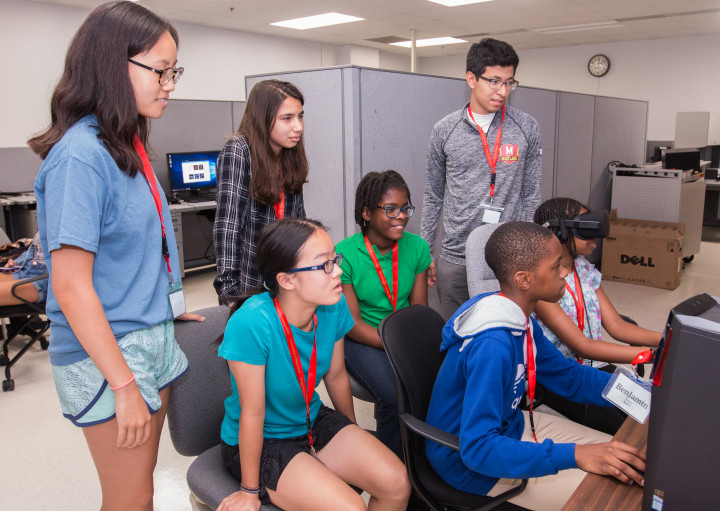Rise Up 4 CS+ Helps High School Students Get Computer Science College Credits
This May, thousands of students across the country will put a year’s worth of computer science learning to the test—literally.
The Advanced Placement (AP) exams for Computer Science A and Computer Science Principles will determine whether high school students learned enough in their courses this year to receive college credit.
“Taking and passing the AP exam offers you a lot of possibilities,” said Priscilla Wu, a senior at Winston Churchill High School in Potomac, Maryland, who will take the AP Computer Science Principles exam in May. “If you have a lot of AP credits, you are able to be more flexible with your schedule. You can take a semester or a year off to take an internship, you can take more electives or you can simply save money.”
The University of Maryland’s Iribe Initiative for Inclusion and Diversity in Computing helps local students like Wu pass their AP computer science exams through its Rise Up 4 CS+ program. The free program is offered to all local high school students—including those who identify as a woman, nonbinary, Black, Latinx or American Indian—who are enrolled in the AP courses at their school. The students receive practice tests questions, one-on-one virtual tutoring with college students and weekly webinars where they review content for the exam.
“It’s great to have extra help to prepare for the exam,” said Wu, a participant in the program. “I also like the tutoring sessions with college students because sometimes it can be intimidating to talk to your teacher, and I feel more comfortable talking to someone closer to my age.”
Sarah Flores, a junior computer science major at UMD and tutor for Rise Up 4 CS+, remembers having similar feelings when she participated in the program while she was in high school.
“When I was in the program, all of the tutors were so nice and helpful and it was great to be in such a supportive environment,” she recalled. “The program gives students a safe space to learn and ask any questions. I remember in my AP computer science class in high school there were a lot of boys in my class and it was a little intimidating, but in the Rise Up program, there were a lot of girls participating and it made me feel more comfortable.”
UMD launched its Rise Up program in spring 2017 in partnership with the University of Michigan, where Rise Up 4 CS creator Barbara Ericson is an assistant professor.
“I created Rise Up 4 CS to help underrepresented high school students succeed in their Advanced Placement computer science courses,” Ericson said. “This project provides additional help sessions to high school students in AP CS courses and uses undergraduate students as near-peer role models and mentors.”
Last fall, UMD expanded its program with additional funding from the technology coalition Reboot Representation.
“Reboot Representation funds the University of Michigan program, and they were impressed with our program and wanted to fund ours as well,” said Charlotte Avery, the outreach coordinator for the Iribe Initiative for Inclusion and Diversity in Computing. “Out of all of the schools that have Rise Up programs, Maryland’s is one of the strongest when it comes to student success rates. This intrigued them and led them to want to support our program.”
The program relies on the participants to report whether they passed their AP exams, and at least half of the students in the UMD program self-report their scores. That’s a high percentage compared with other schools.
Each year, the program usually starts with 35 to 40 students, and this year the retention rate has been especially high due to the flexibility afforded by going virtual.
“If students can’t make the live webinar lessons, they can access them later on or they can attend the tutoring sessions,” Avery explained. “We can also check in with students who have stopped attending and encourage them to return.”
Wu has taken advantage of the added flexibility. She has class when the webinars take place, but she attends the one-on-one tutoring sessions.
“It’s great to have the college students as a resource and to serve as a refresher for what I learned in class,” Wu said. “It’s also great to talk to them about college life since I will be deciding which college I want to go to soon.”
Flores enjoys the tutoring sessions as well. She hopes by helping high school students prepare for these exams, she’ll help spark their interest in computer science that will stay with them long after the program is over.
“I love tutoring because I really love when I’m able to help someone figure out a problem,” she said. “When you can help them find a solution after working on it, it’s a great feeling, and I hope helping them achieve that will keep them motivated to stick with computer science.”
Flores encourages high schoolers to participate in Rise Up 4 CS+ if they are considering it.
“If students are thinking about joining, I think they should at least give it a try,” she said. “All of the tutors are nice and supportive, and you can get to know other CS students and make new friends.
Written by Chelsea Torres
The Department welcomes comments, suggestions and corrections. Send email to editor [-at-] cs [dot] umd [dot] edu.
